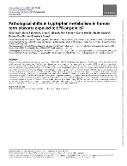Pathological shifts in tryptophan metabolism in human term placenta exposed to LPS or poly I:C

Autor
Abad, Cilia
Karahoda, Rona
Orbisová, Anna
Datum vydání
2024Publikováno v
Biology of ReproductionRočník / Číslo vydání
110 (4)ISBN / ISSN
ISSN: 0006-3363ISBN / ISSN
eISSN: 1529-7268Informace o financování
MSM//LX22NPO5107
UK/COOP/COOP
MZ0/NU/NU20-01-00264
UK/GAUK/GAUK349521
Metadata
Zobrazit celý záznamTato publikace má vydavatelskou verzi s DOI 10.1093/biolre/ioad181
Abstrakt
Maternal immune activation during pregnancy is a risk factor for offspring neuropsychiatric disorders. Among the mechanistic pathways by which maternal inflammation can affect fetal brain development and programming, those involving tryptophan (TRP) metabolism have drawn attention because various TRP metabolites have neuroactive properties. This study evaluates the effect of bacterial (lipopolysaccharides/LPS) and viral (polyinosinic:polycytidylic acid/poly I:C) placental infection on TRP metabolism using an ex vivo model. Human placenta explants were exposed to LPS or poly I:C, and the release of TRP metabolites was analyzed together with the expression of related genes and proteins and the functional activity of key enzymes in TRP metabolism. The rate-limiting enzyme in the serotonin pathway, tryptophan hydroxylase, showed reduced expression and functional activity in explants exposed to LPS or poly I:C. Conversely, the rate-limiting enzyme in the kynurenine pathway, indoleamine dioxygenase, exhibited increased activity, gene, and protein expression, suggesting that placental infection mainly promotes TRP metabolism via the kynurenine (KYN) pathway. Furthermore, we observed that treatment with LPS or poly I:C increased activity in the kynurenine monooxygenase branch of the KYN pathway. We conclude that placental infection impairs TRP homeostasis, resulting in decreased production of serotonin and an imbalance in the ratio between quinolinic acid and kynurenic acid. This disrupted homeostasis may eventually expose the fetus to suboptimal/toxic levels of neuroactive molecules and impair fetal brain development.
Klíčová slova
intrauterine infections, placenta, tryptophan metabolism, fetal brain development, programming
Trvalý odkaz
https://hdl.handle.net/20.500.14178/2419Licence
Licence pro užití plného textu výsledku: Creative Commons Uveďte původ 4.0 International







